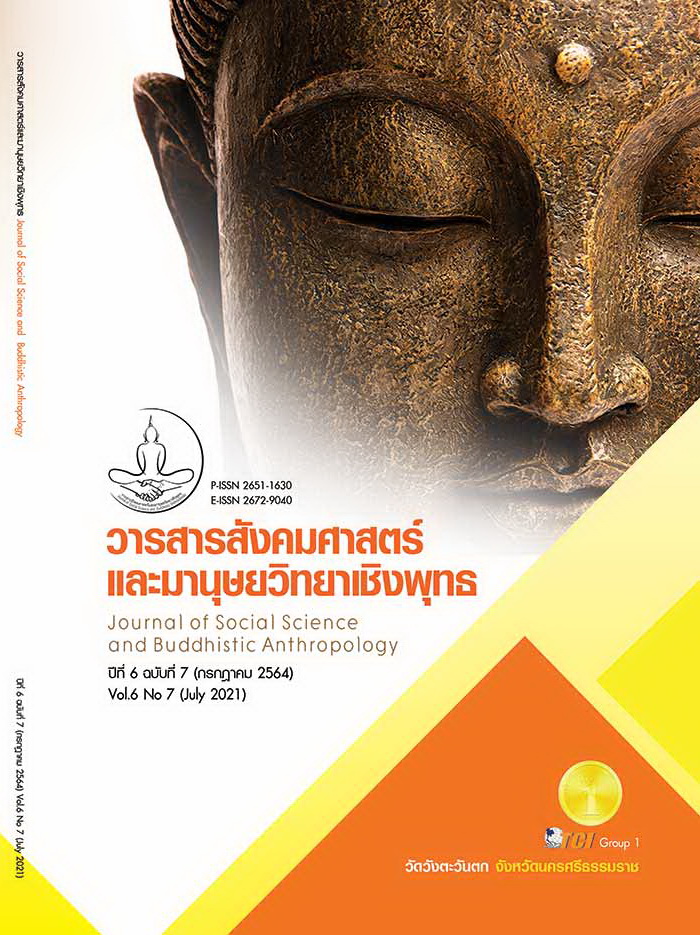DEVELOPING THE RESOLUTIONS FOR THE ELECTRONIC WASTE PROBLEM: A CASE STUDY OF KHOK SA-AD, KHONG CHAI, KALASIN
Keywords:
Qualitative Research, Electronic Waste, Public ParticipationAbstract
The objectives of this research article were to suggest the solutions to electronic waste problems in Khok Sa - ad Subdistrict, Khong Chai District, Kalasin Province from the hidden dangers of electronic waste. This research applied a qualitative method from in - depth interviews using semi - structured interview questions to collect information. Pre - interview questions were created in the data collection stage with fieldwork. The pilot study questions were tested to develop questions and verify their level of validity and reliability. Sampling was selected using purposive sampling from stakeholders aged 20 years and over who have expertise in e - waste or having an occupation in sorting e - waste for at least 10 years and local government officials in the area. The informants consisted of 14 people and staff in Khok Sa - ad Subdistrict Administrative Organization. The interview began during November - December 2020, which was an informal interview. The questions were prepared before the interview. There was a use of recording equipment and taking notes of the interview data. The results of the research showed that solving the problems should seriously involve the public and raise awareness among the people, which will lead to more quality problem solving and reduce the impact that may occur in the future. The occupation of sorting electronic waste in the area has a low level of public participation and people still lack awareness of the dangers of electronic waste. The operation does not take health and the environment into consideration for the community.
References
กรมควบคุมมลพิษ. (2560). รายงานสถานถารณ์ของเสียอันตรายชุมชนปี พ.ศ. 2560. เรียกใช้เมื่อ 10 ตุลาคม 2563 จาก http://infofile.pcd.go.th/haz/wsthazcom _annual60.pdf?CFID=1180512&CFTOKEN=67167200&fbclid=IwAR3kdnEnkqiWPP7ANMQFAFfFMEY7DcyEbd0M3_LcrNH_ZCNDXRGoWkQ6Sbw
กรมควบคุมมลพิษ. (2562). สรุปสถานการณ์มลพิษของประเทศไทยปี 2561. (พิมพ์ครั้งที่ 1). กรุงเทพมหานคร: ส.มงคลการพิมพ์.
กรมควบคุมมลพิษ. (2563). ร่างคู่มือปฏิบัติอย่างง่ายในการถอดแยกซากเครื่องใช้ไฟฟ้าและอุปกรณ์อิเล็กทรอนิกส์ในแหล่งชุมชนอย่างเป็นมิตรต่อสิ่งแวดล้อม. เรียกใช้เมื่อ 10 ตุลาคม 2563 จาก http://www.pcd.go.th/file/Draft-PCD-30-04-2020_01.pdf
กรมส่งเสริมคุณภาพสิ่งแวดล้อม ศูนย์สารสนเทศสิ่งแวดล้อม. (2561). ข่าวอึ้ง! พบชาวบ้านกว่า 100 คน เสี่ยงมีค่าตะกั่วในเลือดเกินมาตรฐาน. เรียกใช้เมื่อ 11 ตุลาคม 2563 จาก https://infotrash.deqp.go.th/index.php/pages/view/infonews_full?news_id=13
กรวรรณ ม่วงลับ เเละนงลักษณ์ สืบนาค. (2560). ความรู้ในการจัดการขยะอิเล็กทรอนิกส์ในครัวเรือนของชุมชนบ้านตลาดเขต จังหวัดกาญจนบุรี. veridian e-journal silpakorn university, 10(3), 1636-1641.
กระทรวงทรัพยากรธรรมชาติและสิ่งแวดล้อม. (2563). สถานการณ์มลพิษของประเทศไทย ปี 2562. เรียกใช้เมื่อ 31 ตุลาคม 2563 จาก https://gnews.apps.go.th/news? news=53637
ณัฏฐกา ชัยเกียรติยศ. (2563). ปัญหากฎหมายเกี่ยวกับการจัดการผลิตภัณฑ์เครื่องใช้ ไฟฟ้าและเครื่องใช้อิเล็กทรอนิกส์ที่ไม่ใช้แล้ว. ใน วิทยานิพนธ์นิติศาสตรมหาบัณฑิต กลุ่มวิชากฎหมายธุรกิจ . มหาวิทยาลัยศรีปทุม.
พีรนาฏ คิดดี และสุทธิพร บุญมาก. (2559). การขับเคลื่อนและอุปสรรคของการจัดการขยะอิเล็กทรอนิกส์ในประเทศไทย. วารสารวิชาการวิทยาศาสตร์และเทคโลโลยี, 8(8), 145-157.
ภูตะวัน แสนใจอิ และสุภาภรณ์ ศิริโสภณา. (2554). ขยะอิเล็กทรอนิกส์:ความเจริญที่ถกถอย. วารสารหน่วยวิจัยวิทยาศาสตร์เทคโนโลยีและสิ่งแวดล้อมเพื่อการเรียนรูป, 2(2), 138-142.
วริทธิ์ สมทรง เเละคณะ. (2563). มาตรการทางกฎหมายเกี่ยวกับการจัดการซากขยะอิเล็กทรอนิกส์: ศึกษากรณีกฎหมายเกี่ยวกับโรงงาน. วารสารรัชต์ภาคย์, 14(36), 93-103.
สายใจ วิทยาอนุมาส. (2560). การจัดการขยะอิเล็กทรอนิกส์ในประเทศไทย. เรียกใช้เมื่อ 11 พฤษจิกายน 2563 จาก https://tdri.or.th/wp-content/uploads/2018 /04/wb133.pdf
สำนักงานสิ่งแวดล้อมภาคที่ 16. (2559). ขยะอิเล็คทรอนิกส์ ใช้แล้วทิ้ง. เรียกใช้เมื่อ 11 พฤษจิกายน 2563 จาก https://reo16.mnre.go.th/reo16/knowledge/detail/211
สุจิรา นาถมทอง. (2559). แนวทางการ ให้ตระหนักในการดูแลสุขภาพ ศึกษาในหมู่บ้านต้นแบบ บ้านโคกประสิทธิ์ หมู่ที่ 12 ตำบลโคกสะอาด อำเภอฆ้องชัย จังหวัดกาฬสินธุ์ 2558. เรียกใช้เมื่อ 25 กรกฎาคม 2563 จาก http://203.157.186.16/kmblog /page_research_detail.php?ResID=6
เอนก ฝ่ายจำปา. (2563). การพัฒนารูปแบบการจัดการขยะแบบมีส่วนร่วมขององค์การบริหารส่วนตำบลจอมศรีอำเภอเชียงคาน จังหวัดเลย. วารสารวิชาการสาธารณะสุขชุมชน, 6(02), 124-124.
Baldé, C. et al. (2017). The global e-waste monitor 2017: Quantities, flows and resources. In International Telecommunication Union and International Solid Waste Association. United Nations University.
Zumitzavan, V. & Michie, J. (2015). Personal knowledge management, leadership styles, and organisational performance: A case study of the healthcare industry in Thailand. Retrieved November 11 , 2020, from https://www. springer.com/gp/book/9789812874375
Zumitzavan, V. (2020). Learning preferences and brand management in the Thai housing estate industry. International Journal of Management and Enterprise Development, 19(1), 42-57.









